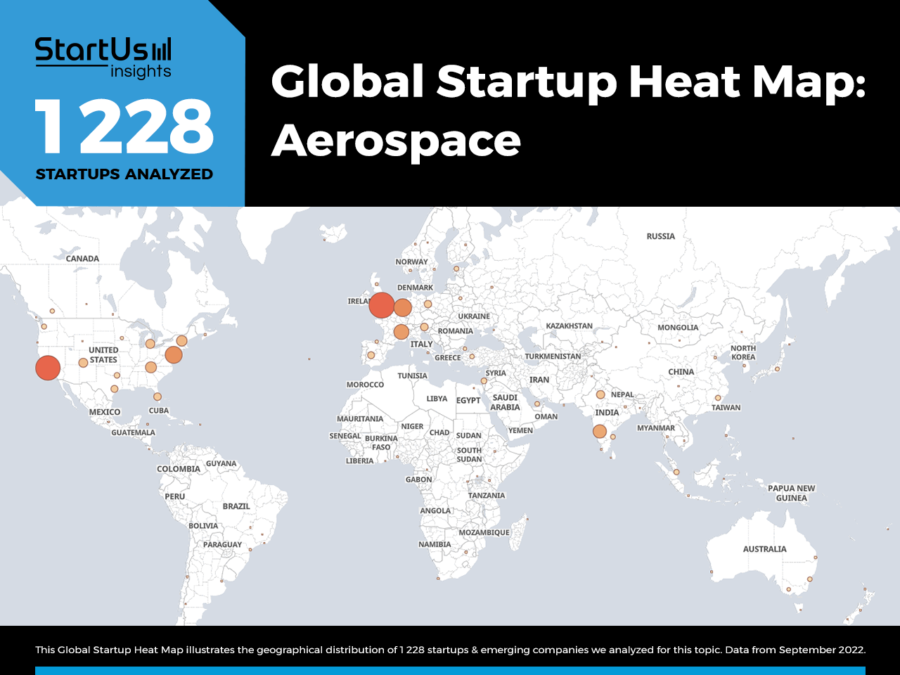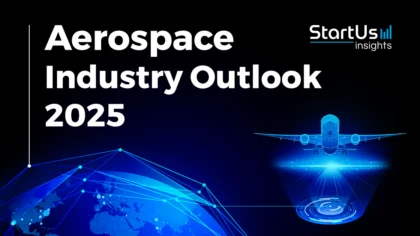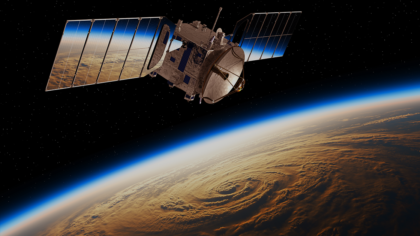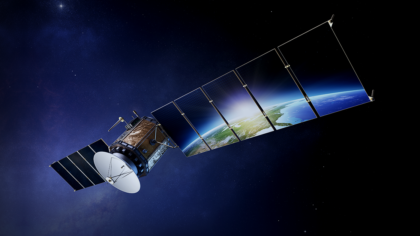Accelerate Productivity in 2025
Reignite Growth Despite the Global Slowdown
Technological advances in the aerospace industry drive sustainability, digitize legacy systems, and automate processes. Additive manufacturing accelerates part development and introduces novel materials, while satellite technology miniaturizes cost-effective systems. Blockchain enhances security and transparency in operations. This report explores key trends, including AI, aerial mobility, and immersive technologies, and highlights innovations shaping the industry.
What are the Top Aerospace Trends (2025)?
- Sustainability
- Artificial Intelligence
- Digitization
- Additive Manufacturing
- Advanced Satellite Technology
- Blockchain
- Aerial Mobility
- Immersive Technologies
Methodology: How We Created the Aerospace Trend Report
For our trend reports, we leverage our proprietary StartUs Insights Discovery Platform, covering 5M+ global startups, 20K technologies & trends plus 150M+ patents, news articles, and market reports.
Creating a report involves approximately 40 hours of analysis. We evaluate our own startup data and complement these insights with external research, including industry reports, news articles, and market analyses. This process enables us to identify the most impactful and innovative trends in the aerospace industry.
For each trend, we select two exemplary startups that meet the following criteria:
- Relevance: Their product, technology, or solution aligns with the trend.
- Founding Year: Established between 2020 and 2025.
- Company Size: A maximum of 200 employees.
- Location: Specific geographic considerations.
This approach ensures our reports provide reliable, actionable insights into the aerospace innovation ecosystem while highlighting startups driving technological advancements in the industry.
Innovation Map outlines the Top 8 Aerospace Trends & 16 Promising Startups
For this in-depth research on the Top Aerospace Trends & Startups, we analyzed a sample of 1200+ global startups & scaleups. The Aerospace Innovation Map created from this data-driven research helps you improve strategic decision-making by giving you a comprehensive overview of the aerospace industry trends & startups that impact your company.
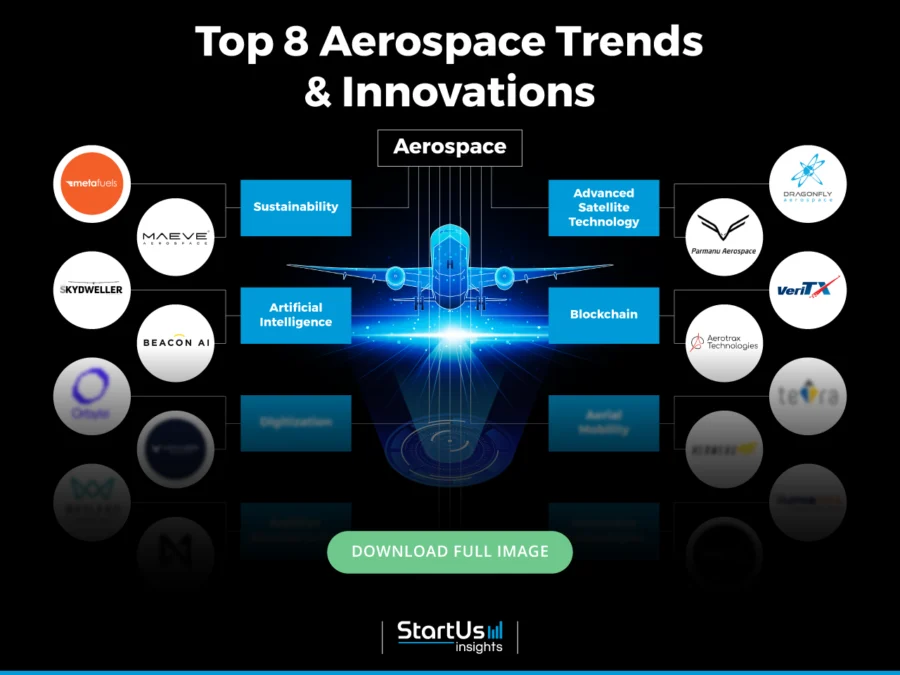
Tree Map reveals the Impact of the Top 8 Aerospace Trends
Based on the Aerospace Innovation Map, the Tree Map below illustrates the impact of the Top 8 Aerospace Trends and Innovations in 2025. Startups and scaleups are focusing on sustainable operations to reduce the industry’s carbon footprint. Aerospace technology companies use AI, machine learning, and deep learning to automate processes and enhance travel efficiency and safety.
Cost-effective small-scale satellites support scientific missions and military applications. Blockchain increases supply chain transparency. Immersive technologies like virtual reality (VR) and augmented reality (AR) assist pilots and improve training, reducing flight risks.
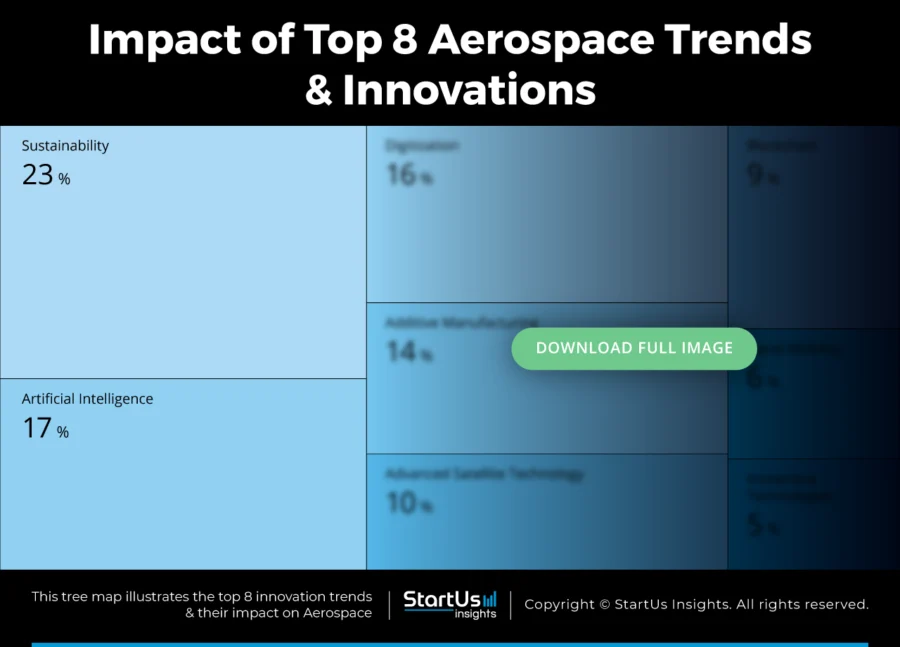
Global Startup Heat Map covers 1228 Aerospace Startups & Scaleups
The Global Startup Heat Map showcases the distribution of 1200+ exemplary startups and scaleups analyzed using the StartUs Insights Discovery Platform. It highlights high startup activity in the United States, followed by the United Kingdom. From these, 16 promising startups are featured below, selected based on factors like founding year, location, and funding.
Want to Explore Aerospace Innovations & Trends?
Top 8 Aerospace Innovation Trends for 2025
1. Sustainability
Growing concerns around climate change among travelers force the aerospace sector to reduce its carbon footprint. Technological innovations aid them in achieving this goal and transitioning to sustainable operations. For example, biofuels reduce the dependence of aerospace operations on fossil fuels to cut down carbon emissions.
Similarly, other alternative energy sources like electric flight technology enable the industry to further curb emissions. Additionally, energy-efficient integrations and novel designs also aid in improving fuel efficiency, thereby reducing emissions and fuel costs.
Interestingly, the global sustainable aviation fuel market was valued at USD 1.1 billion in 2023. It is expected to reach USD 16.8 billion by 2030, with a CAGR of 47.7% during the forecast period.
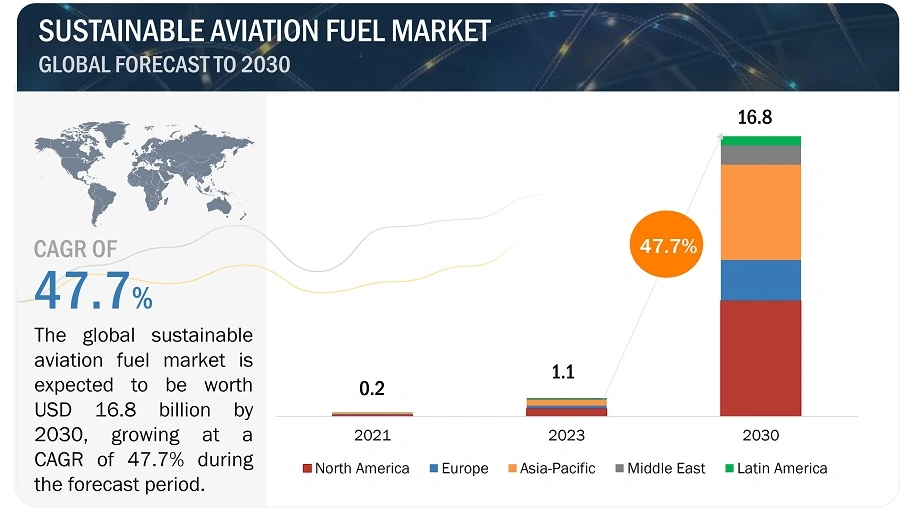
Credit: Markets and Markets
Metafuels offers Alternative Aviation Fuel Technology
Metafuels is a Swiss startup that develops alternative fuels for aerospace operations. The startup’s proprietary technology, aerobrew, converts green methanol into sustainable aviation fuel (SAF).
This technology reduces the carbon footprint by up to 80%, is environmentally friendly, and is also highly scalable. Metafuels thus enable aerospace companies to accelerate the adoption of carbon-efficient alternative fuels.
Maeve Aerospace enables Electric Aviation
Dutch startup Maeve Aerospace manufactures Maeve 01, an all-electric aircraft. It features a proprietary battery stack, up to 550 km range, and 44 passenger seats. Further, the startup offers a rapid charging technology for its plane completely charges the aircraft in 35 minutes.
This makes Maeve 01 a practical alternative to conventional jets for airline operators.
2. Artificial Intelligence
The primary aim of the adoption of AI in aerospace is to automate manual processes and eliminate human errors. AI, machine learning, and computer vision, among other AI-related technologies, provide insights into the data by discovering new patterns and relations. This aids in various operations like optimizing routes, asset utilization, and improving fuel efficiency.
The global aerospace AI market size is expected to grow from USD 1952.81 million in 2025 to USD 34146.75 million by 2033, with a CAGR of 43% during the forecast period from 2025 to 2033.
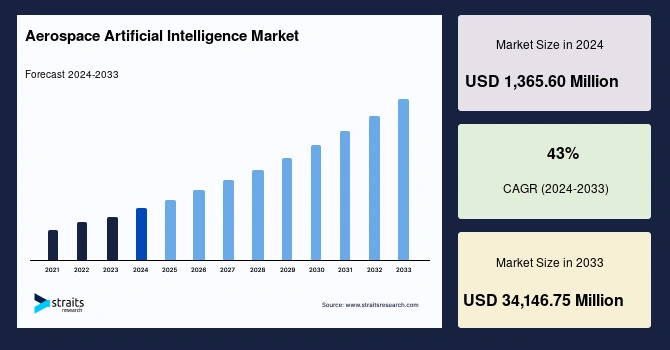
Credit: Straits Research
Moreover, AI handles more complex problems than humans in a much shorter time and offers ideal outcomes. Consequently, the technology aids critical decision-making during autonomous flight operations.
AI also assists human pilots in creating an ideal environment with the benefits of having both manned and unmanned maneuverability.
Skydweller Aero develops Autonomous Flight Technology
Skydweller Aero is a US-based scaleup that makes perennial flight technology through its solar-powered autonomous flight system. By leveraging AI, it performs autonomous waypoint navigation and guides the aircraft through set points.
The aircraft runs on solar power and is also retrofitted with advanced climate and data analysis modules to successfully maneuver in varied weather conditions. It assists in telecommunication, geospatial analysis, and emergency scenarios without human intervention or refueling.
Beacon AI offers AI-enabled Co-pilot
US-based startup Beacon AI leverages deep learning to improve flight safety for commercial and private aviation operations. The startup’s AI assistant works in conjunction with the pilot and acts as a safety net and advisor for them.
Through this, Beacon AI reduces human errors during flights and improves overall operational efficiency. This enables pilots to conduct safer flights and airline operators to optimize resource utilization.
3. Digitization
The aerospace industry embraces digital technologies and smart factories to ensure efficient production and faster design to delivery. Process digitization also allows aerospace companies to stay agile.
Apart from enabling efficient supply chain operations, digitization advances spacecraft and aircraft operational systems. For instance, digitization eliminates data silos between internal systems and improves communication between all stakeholders.
At the same time, this data optimizes engineering processes and enables data-intensive solutions like digital thread, digital twins, and advanced analytics. This allows aviation providers and aerospace manufacturers to avoid bottlenecks and improve efficiency.
Also, the spending on digitalization by aerospace manufacturers (including commercial aircraft, military aircraft, missiles, space vehicles, and satellites) is projected to grow from USD 33.6 billion in 2024 to USD 53.8 billion by 2034, at a CAGR of 4.8%.
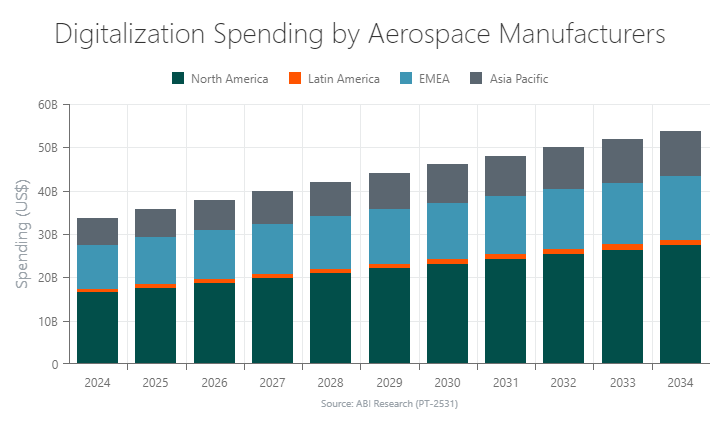
Credit: ABI Research
Orbyte simplifies Flight & Orbital Simulations
Turkish startup Orbyte develops Orbiter, a high-fidelity space simulation software for extraterrestrial mission engineering. It provides solutions such as flight and orbital simulations, AI pilots, and ground station installations, catering to aerospace professionals engaged in designing, simulating, and analyzing space missions.
This technology is advantageous for organizations and researchers dedicated to enhancing space exploration and operational efficiency.
Voyager Space offers Advanced Space Communication
US-based scaleup Voyager Space operates a space-focused communication system. The scaleup offers an alternative solution to traditional space communication using lasers and radio frequencies (RF).
It enables robust connectivity between ground teams and satellites or spacecraft for improved operations. Additionally, Voyager Space develops custom digital communication solutions tailored to specific missions.
4. Additive Manufacturing
Additive manufacturing has been primarily limited to non-essential aerospace parts such as interior components where mechanical stresses are minimal.
However with advances in metal 3D printing, additive manufacturing has become one of the most significant aerospace manufacturing technologies. It enables aviation companies to leverage low-volume production runs cost-effectively.
The market will grow from USD 4.4 billion in 2024 to USD 8.76 billion in 2028, with a CAGR of 18.8%.

Credit: Research and Markets
Additionally, smart material allows manufacturers to deliver stronger and lighter alternatives to parts sourced from conventional materials. Further, additive manufacturing allows aerospace companies to rapidly develop prototypes, reducing development roadblocks and improving efficiency.
Wayland Additive advances Aerospace 3D Printing Machines
Wayland Additive is a UK-based startup that develops 3D printing machines for aerospace manufacturing. The startup’s electron beam additive manufacturing (EBAM) process, NeuBeam Metal AM, allows end-users to develop hard-wearing and high-temperature materials.
This enables aerospace companies to develop stronger and lighter parts such as turbine blades, structural parts, and boosters, reducing flight weight. Consequently, it lowers fuel consumption and emissions while optimizing long-term operational costs.
NematX develops Liquid Crystal Polymer Technology
Swiss startup NematX makes Nematic 3DP, a 3D printing polymer technology for aerospace applications. It combines proprietary part design algorithms and high-precision 3D printing hardware.
Through this, NematX creates parts from liquid crystal polymers (LCP) that feature high thermal resistance and greater mechanical strength than polyether ether ketone (PEEK). This allows aerospace manufacturers to develop precision lightweight components and improve spacecraft performance.

5. Advanced Satellite Technology
Satellite launches make up the majority of commercial space activities, and this trend is expected to further grow in the near future. The primary driver is the falling costs of launching satellites into orbit and the growing need for geospatial intelligence and satellite imagery.
Satellite miniaturization enables pico and nanosatellites that are easily launchable and in scale. The need for global connectivity for the internet of things (IoT) integration also drives satellite-based communication systems. Further, additive manufacturing optimizes satellite production and maintenance while enabling in-orbit services.
Dragonfly Aerospace provides Satellite Buses
Dragonfly Aerospace is a South African startup that builds outer space CubeSat deployment platforms. uDragonfly Bus is a 100 kg satellite bus that accommodates small sats and equipment such as electro-optical imagers and high-speed scanning devices for earth observations.
Similarly, Dragonfly Bus is a larger satellite bus capable of carrying larger payloads and sensors. This enables startups and small satellite manufacturers to launch satellites into lower earth orbit (LEO) in an affordable manner.
Vestigo Aerospace develops Drag Sails for Deorbiting Satellites
US-based startup Vestigo Aerospace enhances orbital sustainability with its dragsail technology, enabling the deorbiting of CubeSats, small satellites, and launch vehicle stages. Its Spinnaker dragsails deploy thin-membrane structures to increase a satellite’s surface area and augment atmospheric drag for faster orbital decay.
These dragsails use radiation-tolerant electronics and materials resistant to atomic oxygen, ensuring reliability after extended periods in orbit. By facilitating timely deorbiting, Vestigo Aerospace enables satellite operators comply with FCC regulations, reduce collision risks, and contribute to the long-term usability of low Earth orbit.
6. Blockchain
Blockchain uses public-key encryption for high-level data security and greater network resiliency to avoid a single point of failure. As the aerospace industry relies on complex supply chains, blockchain improves access and visibility into supply chain data.
Additionally, access rights and entitlement management is automated by leveraging blockchain to enable better traceability and tracking. Blockchain also allows aerospace manufacturers to enable secure, traceable, and shareable records across all supply chain stakeholders. Consequently, this allows manufacturers to identify inefficiencies and mitigate potential bottlenecks.
The global aviation blockchain market is projected to grow from USD 831.1 million in 2024 to USD 3315.6 million by 2032, with a CAGR of 18.9%.
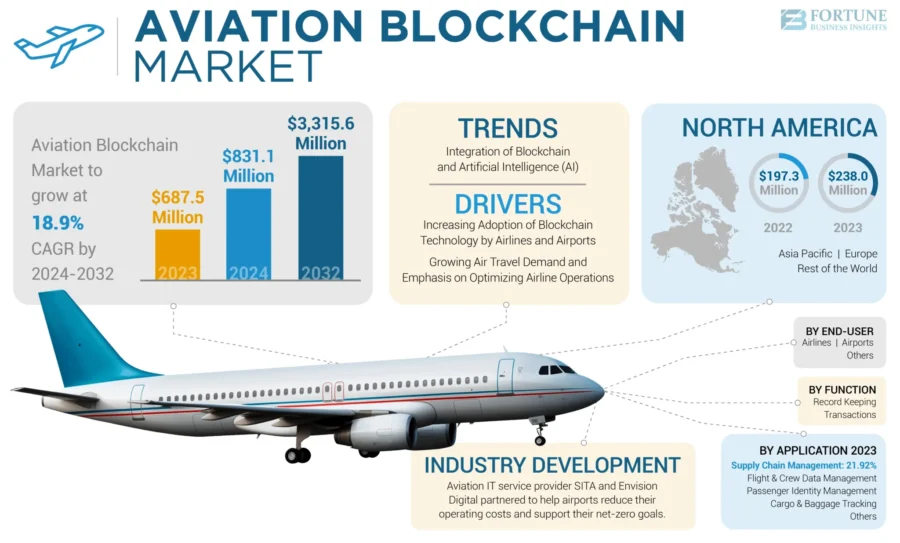
Credit: Fortune Business Insights
VeriTX simplifies Digital Supply Chain Tracking
VeriTX is a US-based startup that makes a platform to regulate aerospace supply chains. It allows aerospace companies to digitize end-to-end supply chain operations.
Moreover, all the actions are recorded in blockchain-based digital records, which improves process traceability. This data allows companies to leverage predictive and prescriptive maintenance as well as enable reverse forensics upon incidents. As a result, the startup reduces operational and maintenance costs.
Aerotrax Technologies streamlines Aircraft Maintenance Management
Aerotrax Technologies is a US-based startup that utilizes blockchain to track aircraft component lifecycle. The startup’s platform, aerotrax operating system (aOS), offers a single source of tracking by recording their validated service records on a distributed ledger system.
The information is also utilized in Aerotrax’s digital supply chain network for seamless transactions between operators, suppliers, and maintenance providers. This enables aviation companies to improve maintenance tasks, thereby reducing turnaround time and improving customer satisfaction.
7. Aerial Mobility
Advances in aerial mobility include advanced air taxis as well as drones for hyperlocal deliveries and emergency services, among others. Faster flight technologies like supersonic and hypersonic flights also show a growing resurgence with the aim of reducing air travel time for customers.
The global advanced aerial mobility market size was valued at USD 8.39 billion in 2023. It is predicted to reach USD 57.96 billion by the end of 2032, with a CAGR of 21.3% during the forecast period.
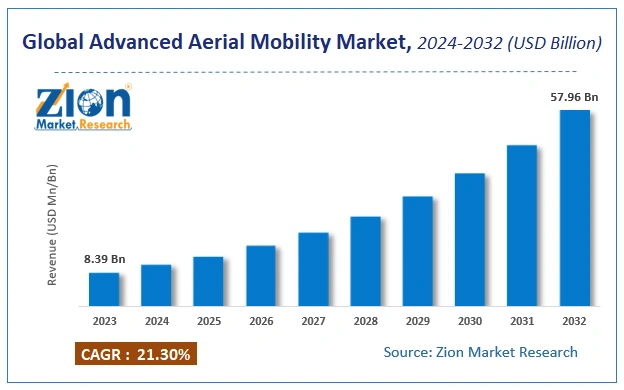
Credit: Zion Market Research
Further, electric vertical take-off and landing (eVTOL) technology see rapid developments in recent years. It reduces aircraft carbon footprint and drives novel use cases by operating in small confined spaces. This includes short-route transportation, military applications, last-mile delivery, and more.
Tetra Aviation provides eVTOL Technology
Japanese startup Tetra Aviation develops eVTOL-based single-seat flying crafts.
The startup’s commercial aircraft platform, Mk-5, assists valuable personnel such as doctors and first responders to be transported to emergency areas. They include disaster locations where mobility is restricted.
Hermeus offers Hypersonic Flights
Hermeus is a US-based scaleup that develops hypersonic aircraft. The startup’s proprietary hypersonic engine, Chimera, reaches Mach 5 speeds. Hermes’ other aircraft, Halcyon and Quaterhorse, are hypersonic passenger and engine performance testing aircraft.
The startup’s flight technology thus allows airline operators to reduce flight times for long-haul air travel as well as increase safety.
8. Immersive Technologies
Immersive technologies find application in aerial military operations and for aerospace employee training. They aid visualization of navigating systems, air-traffic control, weather airspace information, and many other workflows.
Immersive technologies such as VR and AR allow engineers and pilots to mitigate complex learning mechanisms. They also enable operators to work in virtual environments and view composite structures.
At the same time, AR provides an added layer of information for pilots through helmets or glasses and assists them in operating aircraft more efficiently, thereby reducing the chances of mishaps.
Moreover, the market is projected to grow from USD 1035.8 million in 2024 to USD 3632.9 million by 2032, with a CAGR of 17.0% during the forecast period.
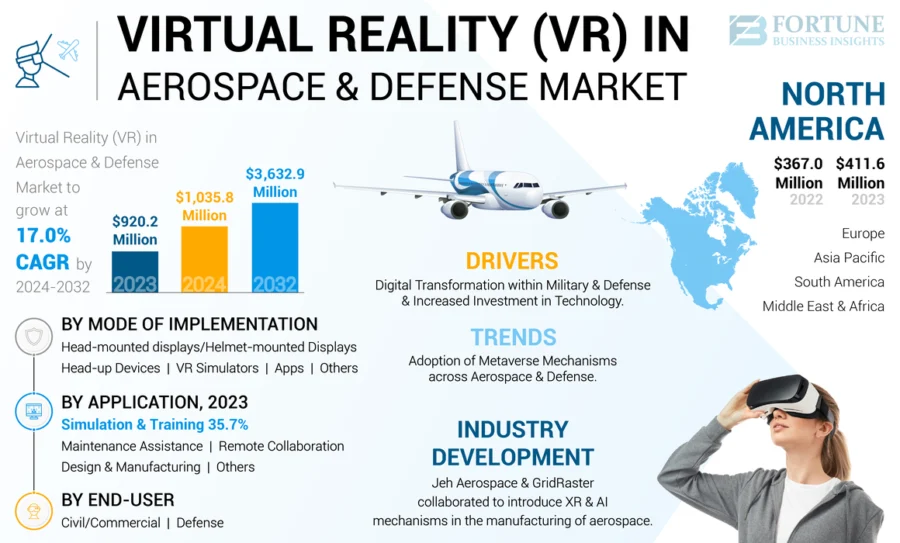
Credit: Fortune Business Insights
Illumia Labs enables Aircraft Maintenance
Canadian startup Illumia Labs develops a simulation platform for technicians and engineers to refine maintenance skills on virtual aircraft. The platform offers immersive training modules and interactive scenarios that enable users to diagnose and resolve mechanical issues in a digital environment.
It uses AI-driven analytics and realistic simulations to enhance technical proficiency, reduce human error, and minimize aircraft downtime. Illumia Labs improves operational efficiency in the aerospace sector by providing a scalable and cost-effective training solution that ensures precision and compliance in aircraft maintenance.
Fyr offers Augmented Flight Glasses
US-based startup Fyr provides a head-mounted AR-based visualization system to augment the vision of pilots. The startup’s solution allows pilots to visualize their surroundings and assists them during flight simulations and training. The glasses provide a 3D field of view and additional situational awareness.
Discover all Aerospace Trends, Technologies & Startups
The aerospace industry is transitioning to climate-conscious technologies to reduce carbon emissions. Advances in AI automate operations and enable autonomous flights while small satellites aid low-cost operations. Smart materials and 3D printing will also reduce production and performance bottlenecks. Ultimately, aerospace innovations power high-speed mobility and cost-effective aerial missions.
The Aerospace Trends & Startups outlined in this report only scratch the surface of trends that we identified during our data-driven innovation and startup scouting process. Among others, supersonic flights, satellite communication, and AI will transform the sector as we know it today.
Identifying new opportunities and emerging technologies to implement into your business goes a long way in gaining a competitive advantage. Get in touch to easily and exhaustively scout startups, technologies & trends that matter to you!

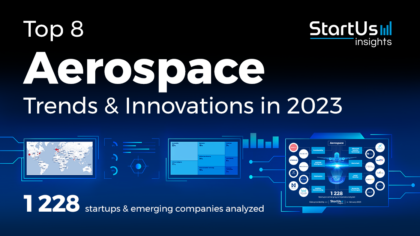

 WATCH THE VIDEO VERSION
WATCH THE VIDEO VERSION 